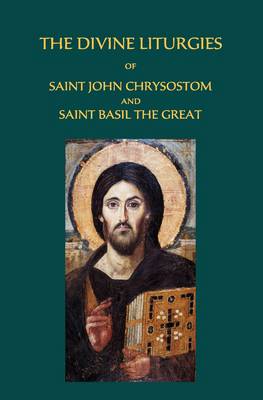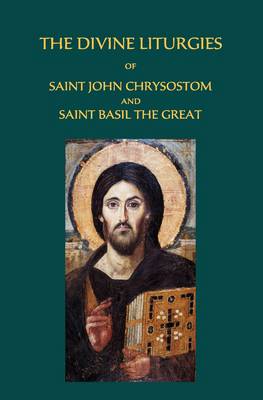
- Retrait gratuit dans votre magasin Club
- 7.000.000 titres dans notre catalogue
- Payer en toute sécurité
- Toujours un magasin près de chez vous
- Retrait gratuit dans votre magasin Club
- 7.000.0000 titres dans notre catalogue
- Payer en toute sécurité
- Toujours un magasin près de chez vous
The Divine Liturgies of Saint John Chrysostom and Saint Basil the Great
Dan Juncu, John Chrysostom and Basil the Great
Livre broché | Anglais
17,45 €
+ 34 points
Description
Published by the Institute for Orthodox Christian Studies, Cambridge, this translation into modern English is of the two major Liturgies of the Orthodox Church, that of St John Chrysostom (died 407 A.D.)which is used on most occasions when the communion is celebrated, and the fuller Liturgy attributed to St Basil the Great (died 379 A.D.), now used on 1 January, the Feast Day of the Saint, on the first five Sundays of Great Lent, and on Holy Saturday. Both liturgies express the essence of the Orthodox Christian faith, and have been in use since the early centuries of the Christian era. St Basil's Liturgy was for many centuries the most used, that of St John Chrysostom taking priority only in the early medieval period. Though both have had material added to them, recent scholarship, by comparing phrases and expressions in the liturgies with works undoubtedly by the two saints, have established that the traditional attributions are likely to be correct.These two translations into modern English were first commissioned by Archbishop Gibran (Ramlawi) for the Antiochian Orthodox Archdiocese of Australasia, to meet a need expressed by the youth of the archdiocese for an elegant and intelligible translation of the services into a modern English that worshippers and visiting friends from varied ethnic backgrounds might find comprehensible and moving.On the publication of the St John Chrysostom Liturgy in its modern version, Philip Tovey in his review for NEWS OF LITURGY wrote: 'This English version of the Orthodox Liturgy is done by David Frost to the high standard we might expect. It is a fresh translation which brings the liturgy to life . . . Indeed, the move to good Modern English shows the Orthodox Liturgy to be something living, rather than looking like a fossil. This translation is another great help in our appreciation of the Divine Liturgy.'This collection also contains translations of the short hymns, troparia and kontakia, that are used on the Sundays and Great Feasts of the Church's year.The text is intended as the foundation English version to be used in a project of the Institute for Orthodox Christian Studies, Cambridge, to provide parallel texts of the Liturgy for use in the various ethnic Orthodox Churches in Great Britain, whereby texts authorized by each Church can be paired with a common English translation of quality that can establish itself as a version familiar to all Orthodox who are bi-lingual and which will be acceptable to those from ethnic Churches who wish to worship in the language of their adopted country.
Spécifications
Parties prenantes
- Auteur(s) :
- Traducteur(s):
- Editeur:
Contenu
- Nombre de pages :
- 144
- Langue:
- Anglais
Caractéristiques
- EAN:
- 9781872897172
- Date de parution :
- 20-03-15
- Format:
- Livre broché
- Format numérique:
- Trade paperback (VS)
- Dimensions :
- 133 mm x 203 mm
- Poids :
- 172 g

Les avis
Nous publions uniquement les avis qui respectent les conditions requises. Consultez nos conditions pour les avis.






